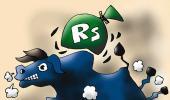These ETFs will carry interest-rate risk, especially the 10-year ETF. The investor can overcome this risk by holding them till maturity, suggests Sanjay Kumar Singh.

The Union Cabinet has given its go-ahead for the launch of India's first corporate bond exchange-traded fund.
It will be called Bharat Bond ETF and will consist of AAA-rated papers issued by government-backed companies.
The base size of the issue will be Rs 7,000 crore, which is extendable to Rs 15,000 crore.
Two ETFs -- one investing in three-year papers and the other in 10-year papers -- will be launched.
A fund-of-fund (FoF) option will also be provided.
The ETFs will have a target maturity structure.
The three-year ETF will mature in April 2023 and the 10-year one in April 2030.
These ETFs will be growth products (they will not pay out interest).
Cost advantage
In India, a lot of debate has taken place on active-versus-passive fund management in the context of equity funds, not so much in debt funds.
"The passive approach is actually more relevant to debt funds as this is not an alpha-generating asset class," says Radhika Gupta, chief executive officer, Edelweiss Asset Management.
The investor may as well go with a passive product where s/he gets the benefit of low cost.
The expense ratio of Bharat Bond ETF is a minuscule 0.0005%.
"In debt funds, the returns are lower than in equity funds, so any saving on cost adds to the investor's return," adds Gupta.
A transparent product
The investor will know the constituents of the index before s/he invests.
Given the spate of corporate defaults over the past year -- many active debt fund managers were caught holding their papers -- investors today want to know beforehand where their money will be invested.
The index yield will be published every night on bharatbond.in.
The index will consist of AAA-rated central public sector enterprises. The credit risk will be negligible here," says Deepesh Raghaw, founder, PersonalFinance-Plan.in, a Sebi-registered investment advisor.
These ETFs will also help mitigate reinvestment risk.
"If an investor finds the yield attractive, s/he can lock into it for 10 years," says Vishal Dhawan, chief financial planner, Plan Ahead Wealth Advisors.
Their taxation will be more favourable than that of bonds and fixed deposits.
In the latter, the interest paid gets added to the investor's income and is taxed at the marginal income tax rate, which hurts those in the higher tax brackets.
ETF investors will be taxed at par with debt mutual funds -- at the rate of 20% with indexation if they hold them for more than three years.
Watch out for liquidity risk:/strong>
Gupta say the issue is large, the constituent bonds are liquid, and market makers have been appointed.
New tranches will be launched periodically.
All these factors, she says, will result in good liquidity on the exchanges.
Market experts, however, are a little wary on this count.
"We will have to wait and see how liquidity pans out in this product. The bid-ask spread will also have to be watched," says Rajesh Cheruvu, chief investment officer, Validus Wealth.
In case of low liquidity, retail investors will be better off taking the FoF option, where redemption will be available through the AMC.
"The expense ratio of the FoF will, however, be higher," says Cheruvu.
These ETFs will also carry interest-rate risk, especially the 10-year ETF.
The investor can overcome this risk by holding them till maturity.
While credit risk will be low, it may not be zero.
"The government may not allow these companies to default. But there is always the possibility of these bonds being downgraded, which could have a mark-to-market impact on the portfolio," says Dhawan.
Buying an ETF will entail paying a brokerage fee.
"If the brokerage fee is 50 basis points, that would be considerable in the context of a debt ETF," says Raghaw.
What should you do?
This product is suitable for an investor who wants a low credit risk product for her/his debt portfolio.
"Those who do not understand the risks in debt funds, find it difficult to select the right category and fund manager, and want a medium to long-duration product, may invest in these ETFs," says Raghaw.
It is not for investors who want regular cash flows.
"Those who wish to circumvent interest rate and liquidity risk should adopt a buy-and-hold strategy.
Those who do not have a demat account should go with the FoF option," says Dhawan.
Sanjay Kumar Singh covers personal finance for the Business Standard newspaper.











